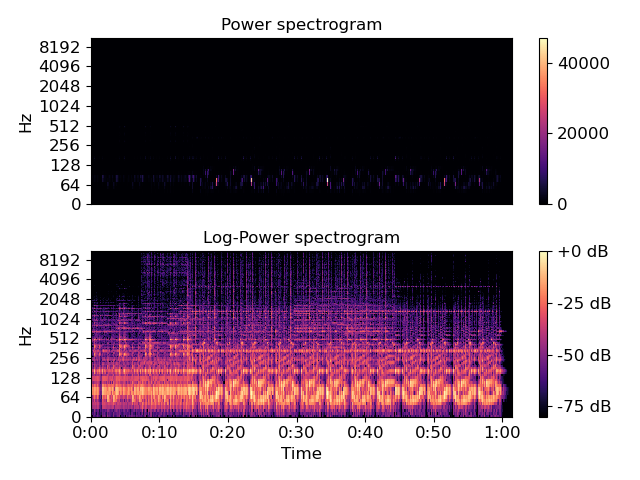Caution
You're reading an old version of this documentation. If you want up-to-date information, please have a look at 0.9.1.
librosa.core.power_to_db¶
- librosa.core.power_to_db(S, ref=1.0, amin=1e-10, top_db=80.0)[source]¶
Convert a power spectrogram (amplitude squared) to decibel (dB) units
This computes the scaling
10 * log10(S / ref)in a numerically stable way.- Parameters
- Snp.ndarray
input power
- refscalar or callable
If scalar, the amplitude abs(S) is scaled relative to ref: 10 * log10(S / ref). Zeros in the output correspond to positions where S == ref.
If callable, the reference value is computed as ref(S).
- aminfloat > 0 [scalar]
minimum threshold for abs(S) and ref
- top_dbfloat >= 0 [scalar]
threshold the output at top_db below the peak:
max(10 * log10(S)) - top_db
- Returns
- S_dbnp.ndarray
S_db ~= 10 * log10(S) - 10 * log10(ref)
Notes
This function caches at level 30.
Examples
Get a power spectrogram from a waveform
y>>> y, sr = librosa.load(librosa.util.example_audio_file()) >>> S = np.abs(librosa.stft(y)) >>> librosa.power_to_db(S**2) array([[-33.293, -27.32 , ..., -33.293, -33.293], [-33.293, -25.723, ..., -33.293, -33.293], ..., [-33.293, -33.293, ..., -33.293, -33.293], [-33.293, -33.293, ..., -33.293, -33.293]], dtype=float32)
Compute dB relative to peak power
>>> librosa.power_to_db(S**2, ref=np.max) array([[-80. , -74.027, ..., -80. , -80. ], [-80. , -72.431, ..., -80. , -80. ], ..., [-80. , -80. , ..., -80. , -80. ], [-80. , -80. , ..., -80. , -80. ]], dtype=float32)
Or compare to median power
>>> librosa.power_to_db(S**2, ref=np.median) array([[-0.189, 5.784, ..., -0.189, -0.189], [-0.189, 7.381, ..., -0.189, -0.189], ..., [-0.189, -0.189, ..., -0.189, -0.189], [-0.189, -0.189, ..., -0.189, -0.189]], dtype=float32)
And plot the results
>>> import matplotlib.pyplot as plt >>> plt.figure() >>> plt.subplot(2, 1, 1) >>> librosa.display.specshow(S**2, sr=sr, y_axis='log') >>> plt.colorbar() >>> plt.title('Power spectrogram') >>> plt.subplot(2, 1, 2) >>> librosa.display.specshow(librosa.power_to_db(S**2, ref=np.max), ... sr=sr, y_axis='log', x_axis='time') >>> plt.colorbar(format='%+2.0f dB') >>> plt.title('Log-Power spectrogram') >>> plt.tight_layout() >>> plt.show()
